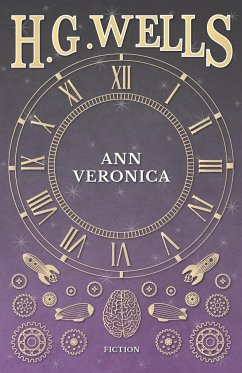To this day, H. G. Wells (1866-1946) is a name synonymous with science fiction. Forced to work as a child to help support his family, Wells was determined to be a learned man. Eventually, he received a degree from London University where he studied evolutionary science under Thomas Huxley. Wells was stricken with tuberculosis shortly after, and in his weakened condition took to writing. Scientific romance, later known as science fiction, is the genre Wells is most famous for, but he was a prolific writer in many other genres. "Ann Veronica" is a testament to Wells' diverse spectrum of interests, as politics and social issues were of great importance to him. The titular character, Ann Veronica, is the embodiment of the feminist ideals rising in importance around the time of the book's publication (1909). Ann Veronica combats the Edwardian English ideals as the male figures in the story can't understand her desire to stray from the dormant, submissive social norms of women.
Bitte wählen Sie Ihr Anliegen aus.
Rechnungen
Retourenschein anfordern
Bestellstatus
Storno








